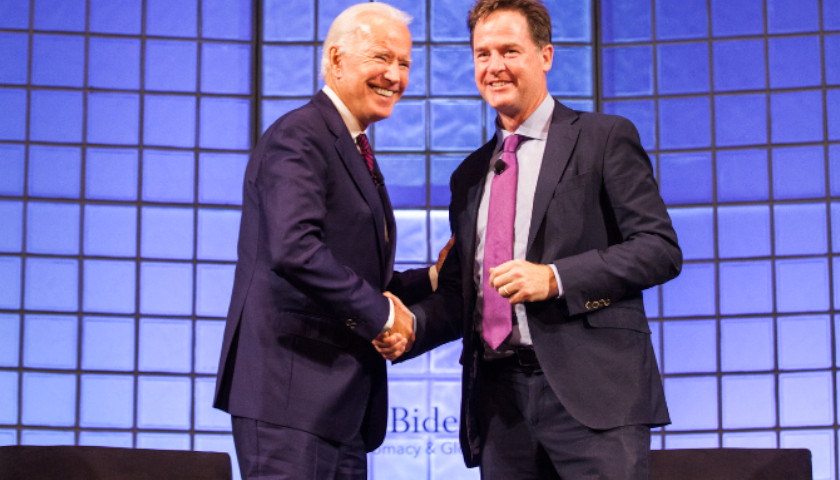Numerous university think tanks have had national political leaders as figureheads. The University of Pennsylvania’s Penn Biden Center for Diplomacy and Global Engagement isn’t unique in that regard. What does set the center apart from similar institutions — besides its recent immersion in national scandal — is its limited research output.
The Penn Biden Center is undergoing intense and somewhat bipartisan criticism for having housed nearly a dozen classified government records after Joe Biden used the space as his main D.C. office from 2017 to 2019 while also nominally working as a professor. The documents were discovered last November, and other restricted federal materials turned up this month in the president’s Delaware home. Some records were generated when Biden served as a U.S. senator, and others materialized when he was vice president.
Biden and his former associates at Penn, several of whom have gone on to join his administration, have also drawn scrutiny for the spate of donations and contract payments from China that poured into the university after the Penn Biden Center began operating.
As The Pennsylvania Daily Star reported last week, the think tank hasn’t published much actual scholarship. Its announcement feed contains many dozens of news articles written about center leaders as well as short opinion pieces written by those individuals.
Its webpage archives indicate it had a hand in issuing only one academic study, a 2018 work called The Democracy Project, which concerned Americans’ attitudes toward representative government. And even that report was produced in collaboration with two other think tanks — D.C.-based Freedom House and the Dallas-based George W. Bush Institute.
The Bush Institute, founded by the recent president and affiliated with Southern Methodist University, is more typical of politician-linked think tanks insofar as it’s busy churning out lengthy social science works. In this month alone, the institute published 11 original reports on immigration, the Russo-Ukrainian War, democracy, disinformation, and education. The institute, which opened a decade ago, is part of SMU’s George W. Bush Presidential Center, which also oversees Bush’s presidential library and museum.
Another collegiate institute linked to a federal politician, Arizona State University’s McCain Institute, also has kept itself focused on academic work since it opened in 2012. The institute, which is named after the late Senator John McCain (R-AZ) and which maintains his family’s archives, frequently publishes its own studies and reports, largely on foreign policy.
The Howard H. Baker Jr. Center for Public Policy at the University of Tennessee, Knoxville, named in honor of the late Senate leader and White House chief of staff, has likewise issued a trove of detailed white papers, reports, and policy briefs written by UTK professors and their colleagues at other universities. Subjects range from environmental stewardship to medical marijuana to tax policy.
The late lawmaker’s namesake James A. Baker III, who was also a White House chief of staff under George H. W. Bush and Ronald Reagan, serves as honorary chair of Rice University’s Baker Institute for Public Policy in Houston, Texas. That think tank also publishes data-intensive scholarship on various matters, including energy policy, finance, and healthcare.
One university institute that does not boast an extensive library of original scholarship is the Robert J. Dole Institute of Politics at the University of Kansas. The center named after the late Republican Senate leader and presidential candidate does, however, claim to house “one of the largest Congressional archives in the United States, with materials on a wide range of topics important to 20th-century American social and political history.”
Incidentally, around the same time the Penn Biden Center opened its doors in 2017, Biden became founding chair of the University of Delaware’s Biden Institute, a think tank focused on domestic policy. Like its counterpart at Penn, it has published little to no in-depth academic research, instead touting its frequent events and putting out short articles and blog posts.
The UD institute is chaired by Biden’s sister, Valerie Biden Owens, who, like the president, graduated from the Newark-based university. The Biden Institute did not respond to an email inquiring whether it has any major research projects completed or in the works.
– – –
Bradley Vasoli is managing editor of The Pennsylvania Daily Star. Follow Brad on Twitter at @BVasoli. Email tips to [email protected].
Photo “Joe Biden” by Penn Biden Center.









How do you expect scholarly work to be published by a plagiarist imbecile surrounded by his nincompoop cronies at the Penn Biden Center and the Biden Institute at UD (Unfit and Derelict).
Whatever it is or whatever those clowns do, you can bet it lines their pockets with taxpayer cash and gives to bidens owners in china.
Make that a stink tank to more appropriate.